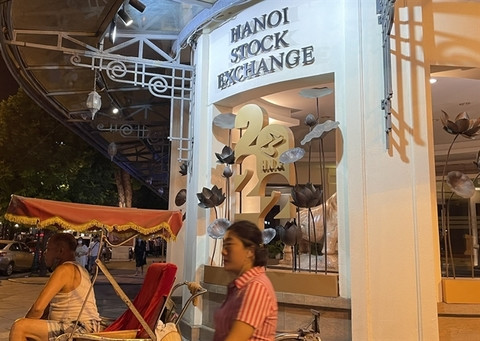
Outside the Hà Nội Stock Exchange's building in Hà Nội. — VNS Photo Ly Ly Cao
In a recent report, Miko Huang, Manager of Equity Index Product Management at FTSE Russell, said that Vietnamese stocks are seen as a bright spot in the Asian region, thanks to the country's strong recovery post-COVID-19.
According to Huang, Việt Nam's GDP grew by 8 per cent in 2022, and the FTSE Vietnam 30 index recorded a gain of 12 per cent compared to the beginning of the year.
Moreover, the cooperation between the Vietnamese stock exchange and FTSE Russell, as well as the Singapore exchange, will support Việt Nam in creating a comprehensive ecosystem, helping foreign investors access Vietnamese stocks and control related risks.
For growth drivers, Việt Nam has advantages in production costs and a young and skilled workforce, thereby making it an attractive destination and benefiting from the shift in supply chains of large corporations, the report said.
FTSE Russell stated that the Vietnamese economy is still recovering and becoming a beacon in the Asia-Pacific region despite global economic and political fluctuations. In recent years, Việt Nam has benefited from the trend of supply chain shifting, a sharp increase in foreign direct investment (FDI), and a stable political situation.
After a challenging period in 2022, the Vietnamese Government has implemented many policies to promote economic growth, including tax cuts, loosening monetary policy, and measures to address challenges in the real estate market.
As a result, the country is on the road to recovery in 2023. The GDP in the second quarter of 2023 increased by 4.14 per cent year-on-year and exceeded the growth rate of the first quarter of 2023.
During this period, the exchange rate of the Vietnamese đồng remained stable, thanks to abundant foreign exchange reserves, a trade surplus, improvements in the flows of FDI disbursement, recovery of the tourism industry, and the weakening of the US dollar, according to the report.
The manager of FTSE Russell stated that Việt Nam is drawing attention from global investors because Vietnamese stocks offer a higher long-term rate of return (ROR) than stocks in other emerging markets in the region and the world.
The growth of 10-year cumulative profits of stocks on the Vietnamese exchanges reached 107.8 per cent, whereas other emerging markets registered more modest returns. The Vietnamese market also has a low correlation with other markets, making Việt Nam an appealing destination for investment diversification.
From the outset, the FTSE Vietnam 30 Index, which comprises the 30 largest companies listed on HOSE, has risen by 12 per cent (in USD terms). This performance surpasses that of the FTSE Asia-Pacific (3.3 per cent), FTSE Emerging (3.9 per cent), FTSE China A (-3.5 per cent), and FTSE ASEAN Extended (-1.1 per cent).
Notably, financial and industrial stocks have made the most significant contributions to the index's growth.
The average 12-month price to earnings (P/E) ratio of the FTSE Vietnam 30 Index stands at 15 times, which is highly attractive to investors, particularly those long-term investors seeking businesses with robust profit growth, according to the report.
Upgrade prospects
FTSE Russell indicated that the country's Government is speeding up the operation of the KRX trading system to enable the launch of new products and solutions and to ensure a smooth, continuous, and efficient operation of the market.
The system is anticipated to commence operations at the end of 2023 after a six-month trial period. It is set to reduce the payment time, enhance investment efficiency and market liquidity, and progressively align the Vietnamese stock market with international standards.
Vũ Thị Chân Phương, chairwoman of the State Securities Commission (SSC), in a meeting with institutional investors and partners at the end of August, mentioned that upgrading the stock market is a primary objective that the Vietnamese Government is targeting.
This objective has been incorporated in the "Restructuring the stock market and insurance market up to 2020 with an orientation to 2025" project, as well as in the draft "Stock market development strategy until 2030". Accordingly, Việt Nam aspires to elevate its domestic stock market status from a frontier to an emerging market by 2025.
In particular, prefunding and foreign ownership limits are pivotal challenges that need addressing to entice foreign investors. — VNS